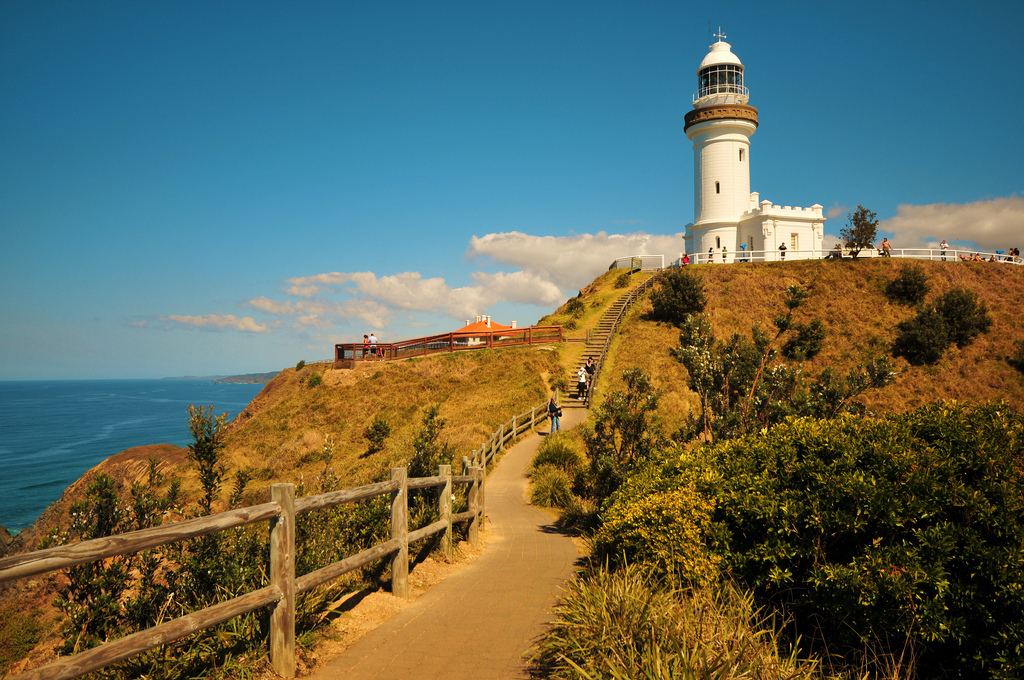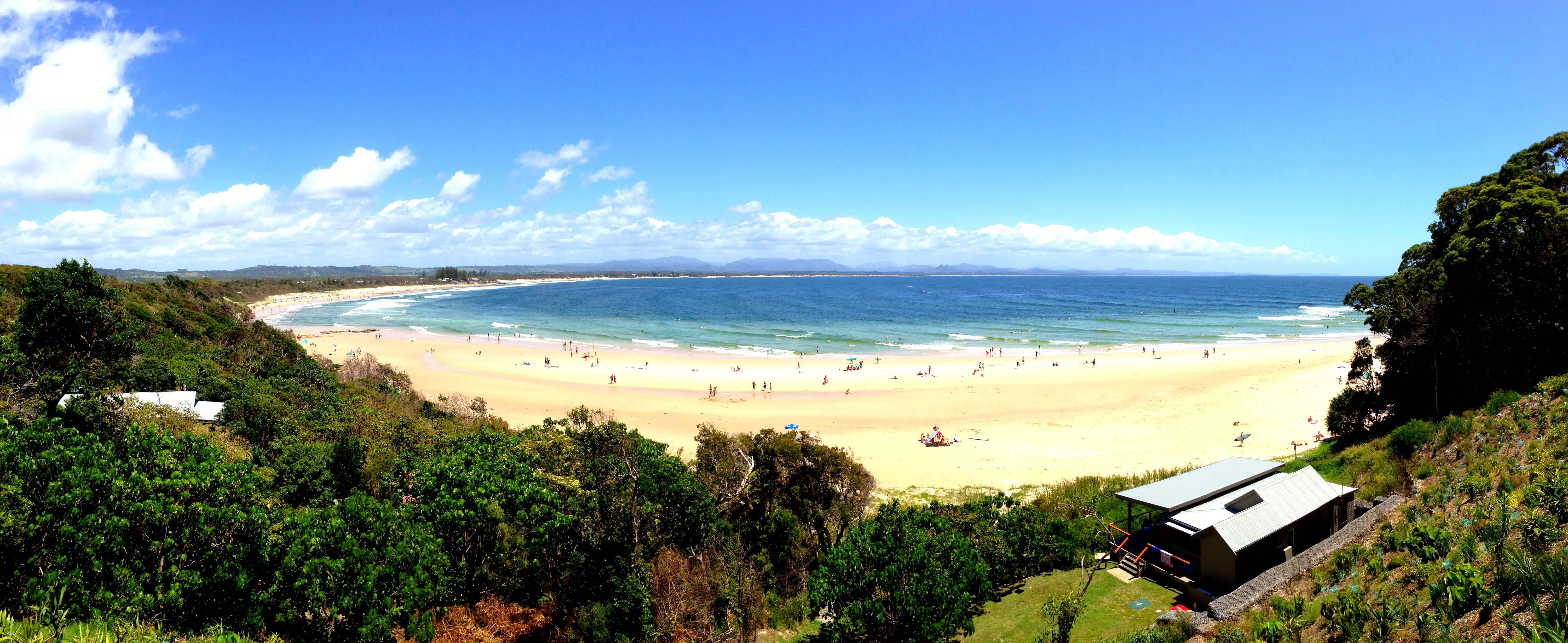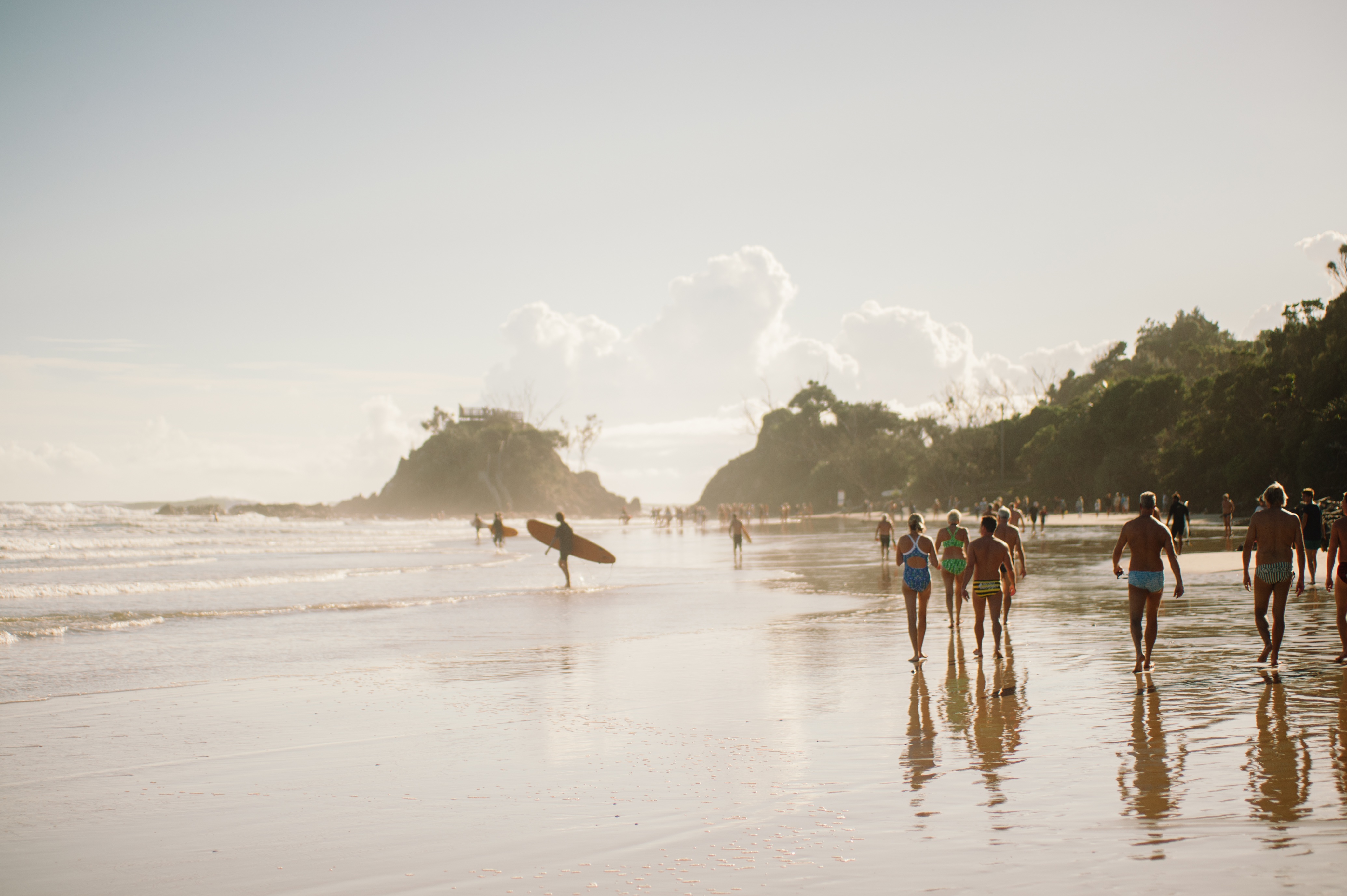Return to the search form Return to your search results
SIT Australia Sustainability and Environmental Action
Fast Facts
Sessions Offered:
Fall, Spring,
Location:
Byron Bay, Australia
Credit:
Transfer
Eligibility:
Good academic and disciplinary standing. Minimum UI and cumulative GPA of 2.5 or higher.
Application Due:
Spring: 9/24
Fall: 2/24
Program Cost:
Click the Application tab.
Program Description

The SIT Experience
- Rigorous academic programs through a field-based, experiential approach
- Undergraduate research through an Independent Study Project
- Cultural immersion through fieldwork, language classes, and urban and rural homestays with local families
- A small group of students in each program, supported by SIT faculty and staff, homestay families, in-country experts, and community members
- Access to SIT's extensive local resources and networks
- A commitment to reciprocity as the foundation of our educational philosophy
Sustainability and Environmental Action
Witness and investigate practical alternatives to current systems that are degrading the environment and increasing inequality and be inspired by the incredible natural beauty of Australia's World Heritage areas.
This program is designed to empower you to make a positive contribution in building more sustainable societies. You will witness and investigate practical alternatives to the current economic system, which is degrading our environment and leading to increasing inequality, and will be inspired by the incredible natural beauty of Australia’s World Heritage areas. You will learn how to apply the principles of sustainability not only in your personal life, but in any career you choose.
With poor soils, unique organisms, and a climate governed largely by El Niño, Australia has keenly felt the effects of climate change. From your base two blocks from the beach in the small coastal town of Byron Bay, you’ll explore Australia’s burgeoning permaculture and sustainable farming initiatives. During excursions and workshops, including ten days in Tasmania, a sustainable urban design workshop in Melbourne, and a five-day camping trip with Aboriginal elders, you’ll meet environmental activists, see examples of successful campaigns, and get tools to apply sustainability efforts at home.You’ll spend much of the program in the field. In each destination, you will learn about climate, geology, geomorphology, soils, and flora and fauna as well as the area’s human history and culture, in order to instill a sense of place and to help understand its unique management issues. During three interactive workshops, you’ll learn about environmental psychology, discover how Aboriginal peoples view and relate to their environments, and get practical tools to take effective action toward environmental social change.
Major topics include:
- Sustainability
- Sense of place
- The natural environment and nature conservation
- Social change and environmental action
- Ecopsychology and environmental ethics
- Aboriginal relationships with the environment
For more information, see SIT's webpage.
Academic Program
Interdisciplinary Seminars
Thematic seminars merge student experience with academic theory to examine critical issues from multiple perspectives. Students learn from SIT faculty as well as guest lecturers from local universities, research institutes, nongovernmental organizations (NGOs), and community and professional associations. Field-based activities and assignments complement readings, discussions, and research papers, allowing students to engage in a variety of study methods.
Research Methods and Ethics
Students learn appropriate methodologies that prepare them to undertake fieldwork on topics connected to the program’s theme and specific cultural context. Students develop research skills and approaches including cross-cultural adaptation and skill building; project selection and refinement; contact and resource cultivation; observation and interviewing skills; gathering, organizing, and presenting findings; and maintaining a field journal. Students also examine the ethics and impact of their research on local communities and are required to follow the World Learning/SIT Human Subjects Review Policy, which serves as an approval process and guide for ethical field study practices.
Independent Study Project (ISP)
Typically conducted during the last month of the semester, the ISP allows students to pursue original field-based research on a topic of their choice within the program’s thematic parameters. The academic director advises each student on developing a project plan. Students also identify an ISP advisor who works with the student on the design, implementation, and evaluation of the student’s research project. Final projects generally include a 20- to 40-page paper and presentation to peers, academic staff, and interested members of the host community.
Cultural Activities
Workshops and Trips
- Ecopsychology Workshop
- Aboriginal Worldview Workshop
- Social Change and Environmental Action Workshop
- Lamington National Park and Seven Mile Beach
- Conservation and Activism in Tasmania
- Aboriginal Camping Trip in New South Wales
- Sydney and Melbourne
Program Dates
Spring: typically the end of January - mid-May
Fall: typically the end of August - beginning of December
For more information go to SIT's Program site.
For more information
Steps to Studying Abroad
- Before initiating an application with SIT, students must complete a Discover Study Abroad session at the University of Iowa.
- After completing the Discover Abroad session, students will receive an email with their study abroad advisor assignment.
- Once assigned, students must meet with their study abroad advisor to receive program application instructions.
Study Abroad
1111 University Capitol Centre
Iowa City, IA 52242
Phone: 319-335-0353
Email:study-abroad@uiowa.edu
SIT Study Center
Much of the program will be spent in the field. A few lectures will take place at the SIT location in Byron Bay.
Byron Bay

Byron Bay is a coastal town in the southeastern Australian state of New South Wales. It’s a popular holiday destination, known for its beaches, surfing, and scuba diving sites. Cape Byron State Conservation Park is on a headland with a lighthouse. Between June and November, humpback whales can be spotted from headland viewpoints such as the Captain Cook Lookout.
Australia
Australia ranks as one of the best places to live in the world according to measurements of income, human development, healthcare, and civil rights. The sixth-largest country in the world by land mass, its comparatively small population of approximately 23 million people is concentrated in the highly-urbanized east and southeast coast of the Australian continent.

US Department of State Country Information
The US Department of State provides safety and security information for every country of the world to help you assess for yourself the risks of travel. Each country information page contains a Travel Advisory, Alerts, and other important details specific to that country that could affect you.
Pay close attention to the entry and exit requirements, local laws and customs, health conditions, and other details to help decide whether traveling to any given country is right for you. Non-US citizen travelers may also wish to seek guidance from the embassy of their country of citizenship. The UI International Travel Policy for Students addresses restrictions on student travel to high-risk locations and engagement in high-risk activities abroad.
Living Arrangements

Homestays are an essential part of SIT Study Abroad’s commitment to providing students with meaningful study abroad experiences that help them understand the realities of living in a particular country. Following orientation in Byron Bay, you will move into a two-week homestay with a family in Lismore or a nearby rural location in northern New South Wales. The homestay will provide you with insights into Australian culture and allow you to establish ties to the community.
Lismore is a typical Australian country town with a population of 30,000 and is home to Southern Cross University. In rural areas near Lismore, you will stay with a host family on a farm or in a small village or hamlet. Many of these communities were settled by people seeking “alternative lifestyles” in the 1970s and more recently by "tree changers" relocating from cities. While in your homestay, you will attend lectures and workshops and undertake day trips in the surrounding area.
Lismore is best known as the gateway to the rainforests of northern New South Wales and the center of the alternative lifestyle movement in Australia. Many homestay families are very knowledgeable about the environment and sustainability, and you will benefit from their firsthand perspectives on the green challenges.
Other accommodations during the program include apartments, hostels, lodges, and campsites.
Travel Arrangements
Students will receive instructions on making travel arrangements during a program-specific orientation session. Students will arrange their own flights to Australia. Upon arrival, ground transportation is available to take students to the program site.
Passport
US Citizens
If you do not have a passport, it is important that you apply for one as soon as possible to ensure you receive it before the program begins. US citizens can find more information about how to apply for a passport on the US Department of State’s website.
Students with a valid passport should check the expiration date. Passports must be valid for at least 6 months AFTER the anticipated return to the US from studying abroad. If your passport is not valid for at least 6 months after your anticipated date of return to the US, you must renew your passport before applying for a visa or leaving the United States.US citizens can find more information about how to renew a passport on the US Department of State’s website.
Travel Arrangements
Students will work with their program provider to make travel arrangements to their program site. The cost of travel is not included in the course fee. UI Study Abroad will not arrange a group flight to your study abroad destination.
Do not purchase plane tickets until you have received instructions on how to do so from your program provider.
Local Transportation
Within your host city and around the country, students will utilize public transportation such as buses and trains. Excursions and general travel require a lot of walking, so bring some comfortable shoes!
Eligibility
Students must have a UI and cumulative GPA of 2.5 or higher, and be in good academic and disciplinary standing. You must be in good academic and disciplinary standing at the university at the end of the semester prior to your study abroad experience. If you are not in good standing at the end of the semester, your acceptance will be revoked and you will be responsible for the associated withdrawal fees.
Costs
Costs charged to the U-Bill
- Application fee (charged at the time of application, before financial aid/scholarships disburse)
- Course Fee- Includes program course fee, tuition, housing, meals, pre-departure advising, airport pick-up for those on the group flight, orientation, and program-organized field trip and excursions. (charged shortly before departure)
- University of Iowa Study Abroad Administrative Fee (charged shortly before departure)
- The mandatory Iowa Regents CISI Health Insurance (charged shortly before departure)
Out-of-pocket costs (not charged to U-Bill)
- Round trip airfare (paid by student directly to travel agent or airline- approx. 6-8 weeks prior to departure, before financial aid/scholarships disburse)
- Passport (paid by student prior to departure, before financial aid/scholarships disburse)
- Consular and visa fees (paid by student prior to departure, before financial aid/scholarships disburse)
- Textbooks, copyright permission fees, course packets, and other course-related materials (paid upoon arrival to your host country)
- Medical exam/immunizations (paid by student as needed prior to departure, before financial aid/scholarships disburse)
- Personal expenses and personal travel (paid by student as needed while abroad)
- Rental or purchase of required cell phone- does not include usage fees (paid as needed while abroad)
Cost Sheet
The cost sheet outlines the total estimated costs associated with participating in this program and can be used for financial aid and planning purposes. They include fees charged on students’ U-Bill as well as out-of-pocket expenses. Actual out-of-pocket expenses will vary from individual to individual. Quoted estimates are conservatively high, yet realistic.
Scholarships & Financial Aid
Most financial aid (scholarships, grants, and loans) is applicable to study abroad programs. Please check the Study Abroad website for information on financial aid and how it may be applied to studying abroad. You are also encouraged to speak with someone at the Office of Student Financial Aid to explore financial aid options. Scholarship opportunities exist for study abroad participants. Please explore Study Abroad’s websites for UI Study Abroad Scholarship Opportunities.
SIT offers scholarships and grants that can be found on SIT's Scholarships & Grants web page.
SIT has a matching scholarship for Pell Grant Recipients. More information can be found on SIT Pell Grant Match Award web page.
How to Apply
- Before initiating an application with SIT, students must complete a Discover Study Abroad session at the University of Iowa.
- After completing the Discover Abroad session, students will receive an email with their study abroad advisor assignment.
- Once assigned, students must meet with their study abroad advisor to receive program application instructions.
Students will need to complete a University of Iowa Study Abroad application and a SIT Program Online Application. Information on these applications will come from the study abroad advisor. Final program admissions decision is made by SIT.
Application Deadline
Applications are due on February 24 for Fall.
Applications are due on September 24 for Spring.
Health & Safety Planning
Students are encouraged to review the following:
Iowa Regents CISI Health Insurance Information
Health preparation Guide for International Travel
This document is intended to help you plan for your medical needs abroad.
Please DO NOT turn this form in to UI Study Abroad.
Visa
U.S. Citizens will need a student visa to study abroad for a semester.
SIT provides Pre-Departure Documents to all program participants. One document is entitled Flight, Passport, & Visa Information. It is essential to read this document and understand what is required to obtain any necessary student visa and/or documents to participate in the program. Ultimately, it is your responsibility to secure any student visa or required documents to participate in the program.
Orientation
In order to prepare for your time abroad, you are required by the University of Iowa to complete two orientations. These may be in addition to orientations provided by your on-site provider. See below for more information.
Online Education Abroad Pre-Departure Orientation
You are required to complete the International Programs ICON course "Education Abroad Pre-Departure Orientation" prior to departure. This orientation is mandatory for all students going abroad under the auspices of the University of Iowa. It covers many practical matters about living overseas, such as health and safety, communication, money, goals, and much more. You will be enrolled in this course by International Programs and an email will be sent to you once enrolled. If you have any questions, you can email safety-abroad@uiowa.edu
Program-Specific Orientation
This orientation will be facilitated by a study abroad advisor and will cover content specific to the University of Iowa including but not limited to, billing, insurance, the Credit Approval Form (CAF), and transcripts. It could be conducted in a group setting or one-on-one depending on your type of planned activity abroad. Your study abroad advisor will send you more information about this mandatory in-person session.
SIT Pre-departure Resources
SIT will provide you with a variety of pre-departure resources to prepare you for your study abroad experience. These will include
- Flight, Passport & Visa Information
- Country Overview & Packing Guidelines
- Health Guidelines & Requirements
- Mental Health, Counseling & Wellness Tips
- Safety, Security & Health
- Recommended Readings & Resources
- SIT Study Abroad Student Handbook
